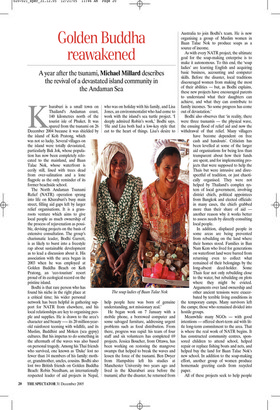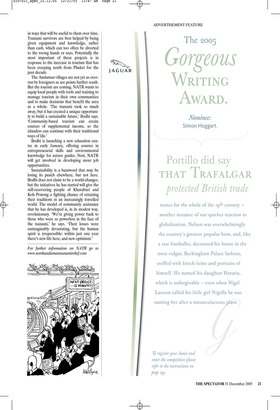Golden Buddha reawakened
A year after the tsunami, Michael Millard describes the revival of a devastated island community in the Andaman Sea Khuraburi is a small town on Thailand’s Andaman coast, 140 kilometres north of the tourist isle of Phuket. It was spared from the tsunami on 26 December 2004 because it was shielded by the island of Koh Pratong, which was not so lucky. Several villages on the island were totally devastated, particularly Bak Jok, whose population has now been completely relocated to the mainland, and Baan Talae Nok, whose waterfront is eerily still, lined with trees dead from over-salination and a lone flagpole as the only reminder of its former beachside school.
The North Andaman Tsunami Relief (NATR) operation sprang into life on Khuraburi’s busy main street, filling aid gaps left by larger relief organisations. It is a grassroots venture which aims to give local people as much ownership of the process of rejuvenation as possible, devising projects on the basis of extensive consultation. The group’s charismatic leader, Bodhi Garrett, is as likely to burst into a freestyle rap about sustainable development as to lead a discussion about it. His association with the area began in 2003 when he was employed at Golden Buddha Beach on Koh Pratong, an ‘eco-tourism’ resort proud of its ecological record on the pristine island.
Bodhi is that rare person who has found his niche in the right place at a critical time; his wider personal network has been helpful in gathering support for NATR from elsewhere, and his local relationships are key to organising people and supplies. He is drawn to the area’s character and beauty —– its 20 million-yearold rainforest teeming with wildlife, and its Muslim, Buddhist and Moken (sea gypsy) cultures. But his impetus to do something in the aftermath of the waves was also based on personal tragedy. Among his Thai friends who survived, one known as ‘Duke’ lost no fewer than 14 members of his family: mother, grandmother, uncles, cousins. Bodhi also lost two British friends on Golden Buddha Beach: Robin Needham, an internationally respected leader of aid projects in Nepal, who was on holiday with his family, and Lisa Jones, an environmentalist who had come to work with the island’s sea turtle project. ‘I deeply admired Robin’s work,’ Bodhi says. ‘He and Lisa both had a low-key style that cut to the heart of things. Lisa’s desire to help people here was born of genuine understanding, not missionary zeal.’ He began work on 7 January with a mobile phone, a borrowed computer and some salvaged furniture, addressing urgent problems such as food distribution. From there, progress was rapid: his team of four staff and six volunteers has completed 69 projects. Jessica Boucher, from Ottawa, has been working on restoring the mangrove swamps that helped to break the waves and lessen the force of the tsunami. Ben Dwyer from Hampshire left his studies at Manchester University two years ago and lived in the Khuraburi area before the tsunami; after the disaster, he returned from Australia to join Bodhi’s team. He is now organising a group of Muslim women in Baan Talae Nok to produce soaps as a source of income.
As with every NATR project, the ultimate goal for the soap-making enterprise is to make it autonomous. To this end, the ‘soap ladies’ are learning English and acquiring basic business, accounting and computer skills. Before the disaster, local traditions discouraged women from making the most of their abilities — but, as Bodhi explains, these new projects have encouraged parents to understand what their daughters can achieve, and what they can contribute to family incomes. ‘So some progress has come out of devastation.’ Bodhi also observes that ‘in reality, there were three tsunamis — the physical wave, the ensuing flood of relief aid and now the withdrawal of that relief. Many villagers have become dependent on free cash and handouts’. Criticism has been levelled at some of the larger aid organisations for being less than transparent about how their funds are spent, and for implementing projects that were supposed to help the Thais but were intrusive and disrespectful of tradition, or just chaotically organised. They were not helped by Thailand’s complex system of local government, involving district chiefs, political appointees from Bangkok and elected officials: in many cases, the chiefs grabbed more than their share of aid another reason why it works better to assess needs by directly consulting local people.
In addition, displaced people in some areas are being prevented from rebuilding on the land where their homes stood. Families in Ban Nam Kem who lived for generations on waterfront land were barred from returning even to collect what remained of their belongings by the long-absent deed-holder. Some Thais fear not only rebuilding close to the water, but rebuilding on plots where they might be evicted. Arguments over land ownership and other ancient tensions were exacerbated by terrible living conditions in the temporary camps. Many survivors left the camps; those who remained divided into hostile groups.
Meanwhile many NGOs — with good intentions — offered short-term aid with little long-term commitment to the area. That is where the real work of NATR begins. It has constructed community centres, sponsored children to attend school, helped repair or replace fishing boats and nets, and helped buy the land for Baan Talae Nok’s new school. In addition to the soap-making effort, another group of women produce homemade greeting cards from recycled paper.
All of these projects seek to help people in ways that will be useful to them over time. Tsunami survivors are best helped by being given equipment and knowledge, rather than cash, which can too often be diverted to the wrong hands or uses. Potentially the most important of these projects is in response to the increase in tourism that has been creeping north from Phuket for the past decade.
The Andaman villages are not yet as overrun by foreigners as are points further south. But the tourists are coming. NATR wants to equip local people with tools and training to manage tourism in their own communities and to make decisions that benefit the area as a whole. ‘The tsunami took so much away, but it has created a unique opportunity to build a sustainable future,’ Bodhi says. ‘Community-based tourism can create sources of supplemental income, so the islanders can continue with their traditional ways of life.’ Bodhi is launching a new education centre in early January, offering courses in entrepreneurial skills and environmental knowledge for nature guides. Next, NATR will get involved in developing more job opportunities.
Sustainability is a buzzword that may be losing its punch elsewhere, but not here. Bodhi does not claim to be a world-changer, but the initiatives he has started will give the still-recovering people of Khuraburi and Koh Pratong a fighting chance of retaining their traditions in an increasingly travelled world. The model of community assistance that he has developed is, in its modest way, revolutionary. ‘We’re giving power back to those who were so powerless in the face of the tsunami,’ he says. ‘Their losses were unimaginably devastating, but the human spirit is irrepressible: within just one year there’s new life here, and new optimism.’ For further information on NATR go to www.northandamantsunamirelief.com


















































 Previous page
Previous page